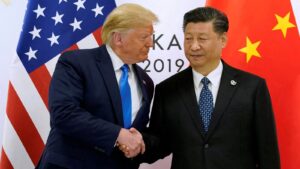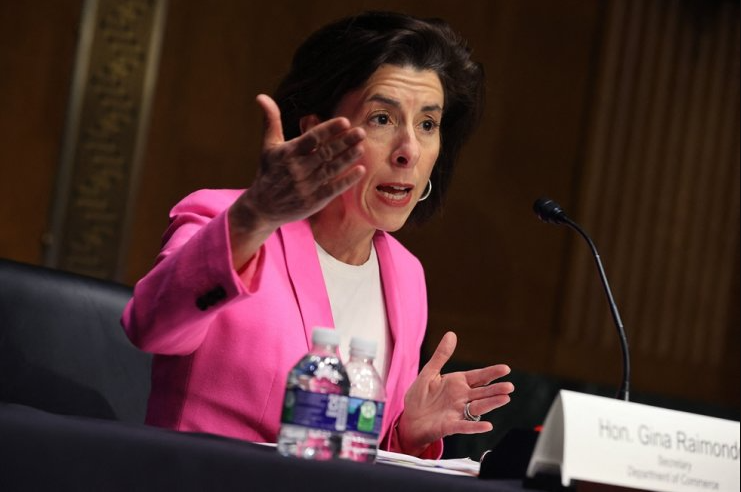|
Getting your Trinity Audio player ready...
|
In a move that highlights growing tensions between the United States and foreign adversaries, the U.S. Commerce Department on Monday proposed a ban on the sale and import of smart vehicles using specific Chinese and Russian technology, citing significant national security risks.
This proposed regulation comes as part of a broader effort by the Biden administration to safeguard American infrastructure from potential cyberattacks and foreign espionage.
National Security at Risk: The Role of Embedded Technology
The push for regulatory action stems from a U.S. government investigation launched in February, which uncovered various security concerns surrounding Chinese and Russian software and hardware components embedded in smart vehicles. These components are increasingly being used in vehicles equipped with advanced technology like autonomous driving systems, artificial intelligence (AI), and sophisticated data-collection sensors.
During a press briefing on Sunday, Commerce Secretary Gina Raimondo detailed the alarming findings, suggesting that foreign actors could exploit these technologies to compromise U.S. infrastructure and jeopardize public safety. “In extreme situations, a foreign adversary could shut down or take control of all their vehicles operating in the United States, all at the same time, causing crashes or blocking roads,” Raimondo stated.
Potential Consequences: Remote Sabotage and Data Theft
The risks, according to the investigation, are twofold: first, there’s the possibility of remote sabotage, wherein hostile governments or cybercriminals could gain access to vehicles en masse, leading to accidents or widespread gridlock.
Second, the embedded software and hardware could be used to collect sensitive data on drivers, including their location, driving habits, and even personal information. This collected data could be used for espionage or other malicious purposes.
“It’s not just a matter of convenience anymore; these technologies are now potential tools for adversaries,” Raimondo stressed.
Timeline for the Proposed Ban
The proposed ban targets vehicles for the “model year” 2027 and beyond. Initially, the ban would focus on software-related concerns, while the more extensive hardware ban would take effect in the 2030 model year, giving automakers time to phase out Chinese and Russian components in favor of more secure alternatives. Importantly, the ban would not apply retroactively to vehicles already on the road that have such software installed, providing some relief to automakers and consumers currently using those vehicles.
However, the phased approach does signal a growing urgency to address potential threats posed by foreign technologies in connected cars, which are increasingly reliant on software updates, wireless connectivity, and AI-driven functionalities.
U.S.-China Tech Rivalry: A Broader Struggle for Control
This regulatory proposal is a critical part of a wider and ongoing struggle between the United States and China, the two largest economies in the world, to secure the supply chains of emerging technologies. With advancements in semiconductors, artificial intelligence, and autonomous vehicle technology, the U.S. and China have been locked in an escalating race to dominate the key computing technologies that will define the future.
China has made significant investments in the connected car market, raising concerns among U.S. officials about the potential for increased influence of Chinese technology in critical sectors. Chinese car manufacturers have already made inroads in Europe, which U.S. officials view as a harbinger of potential threats to American markets.
While China’s technological prowess continues to grow, the United States is taking concrete steps to shore up its defenses against the perceived risks that come with allowing foreign technology to gain a foothold in sensitive areas, such as the automotive and transportation sectors.
Global Implications and Response from Automakers
The proposed regulation could have significant global ramifications, especially for major automakers who rely on global supply chains. Companies like Tesla, General Motors, and Ford, which produce vehicles with sophisticated connected technology, may be forced to rethink partnerships with Chinese manufacturers or suppliers if the ban becomes law. The new rule would likely spur a search for secure alternatives, possibly accelerating efforts to create fully U.S.-controlled supply chains for vehicle technologies.
Industry experts believe that this shift will drive innovation in the development of domestic semiconductors and software solutions. Additionally, some analysts argue that the decision may encourage European automakers to scrutinize their reliance on Chinese technology, which could lead to broader shifts in the global automotive market.
A Strategic Move in the Cybersecurity Landscape
The move to block Chinese and Russian technologies in vehicles is consistent with the broader strategy of the U.S. government to address cybersecurity threats from foreign adversaries. Over the past decade, the rise of connected devices — often referred to as the Internet of Things (IoT) — has created an array of vulnerabilities that could be exploited by malicious actors. Vehicles, with their increasing reliance on wireless updates and connectivity, have become a focal point of concern.
In recent years, the U.S. government has taken similar actions in other industries. Notably, the banning of Huawei and ZTE from building parts of the U.S. 5G infrastructure is perhaps the most significant parallel. The decision to expand these concerns into the automotive sector signals that the U.S. sees this issue as a growing and ongoing challenge.
Public and Industry Reactions
While the government’s stance appears firm, the proposed ban is likely to spark debate. Automakers and tech companies could push back, arguing that the transition away from foreign technology will come with significant costs and supply chain disruptions. Meanwhile, privacy advocates may see this as a necessary step to protect Americans from surveillance and cyberattacks.
As the proposal moves forward, all eyes will be on how U.S. automakers adapt and whether the broader auto industry will support or contest the measures.
Conclusion: A Tipping Point for Connected Car Technologies
With the Commerce Department’s proposed ban on the horizon, the U.S. auto industry faces a crucial crossroads. The ban on Chinese and Russian technologies not only underscores national security concerns but also highlights the need for tighter cybersecurity measures in the increasingly tech-driven automotive world. As the conversation around the regulation unfolds, the industry must balance technological innovation with the pressing need for data privacy and national security.



